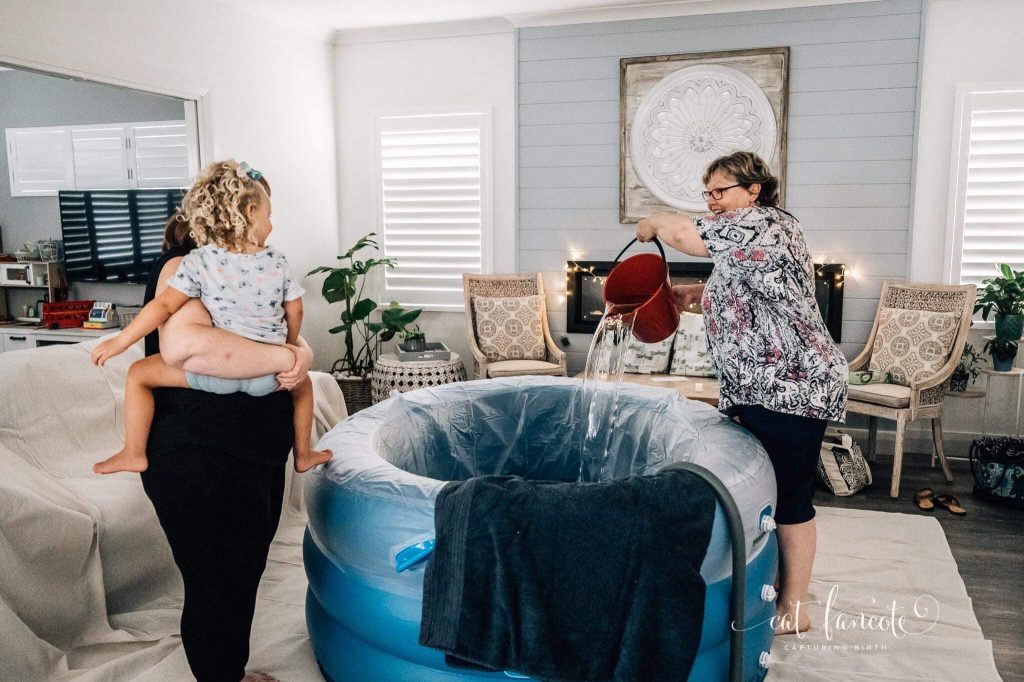Hi, my name is Vicki Hobbs from Back to Basics Birthing and my business has been operating since 2004, so I consider myself a fairly educated woman, and experienced in working with pregnant women in the birthing space, but I would never compare myself to a midwife or medical practitioner.
I also train doulas through the Doula Training Academy along with many other speakers who are researchers, academics and experts in their field who provide up to date evidence-based information
I know this blog is a long one, so if you would prefer to listen to the podcast you can do so by clicking the link:
In light of the recent devastating news in WA where a baby died after a freebirth and the subsequent media frenzy and ill-informed comments around doulas, I felt it was important to guide some of the narrative, and hopefully educate the community about doulas, homebirth and freebirth and our current maternity system.
My heart goes out to the parents, the family, and friends of the couple and also to the doula. They must all be going through so much mentally and emotionally, and for the mum physically as well, but also having to deal with judgement, accusations, and public scrutiny.
The headline claimed “Newborn dies after Perth homebirth with doula goes wrong.“
Firstly, it’s so frustrating when people only read a headline and don’t read the article, and then make assumptions based on the headline, which then exaggerates or deviates from the real story.
Then social media is in a frenzy with people sharing their thoughts and opinions, not facts.
The headline implies that because the doula was there, she is at fault – and judging by the comments the general public think so too and we all know that when a death occurs, particularly when it is a mother or baby, it’s human nature to want to lay blame.
Yes, there was a doula there, but it was not illegal for the doula to be there, and the doula was not employed to provide clinical or medical assistance during the labour and birth.
I saw in one news report it was said that mothers are choosing doulas as a “less expensive” option.
A less expensive option to what?
Quickly people jump to conclusion that doulas are now being hired to replace midwives.
So, I feel the community, including care providers, need to be educated on what a doula is, what a doula is not and what a doula does.
If there is any deviation to that then they are not a doula.
So let me go through some of the questions that I’ve seen asked over the last few days…..
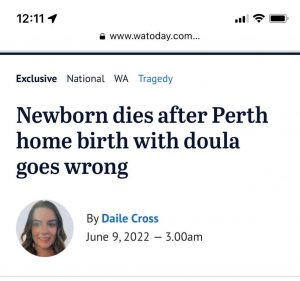
What is a doula?
Again, reading some of the comments in the news report on social media, the majority of the public don’t even know what a doula is or what they do. It’s fair to say that doulas operating as a business is relatively new here in Australia in comparison to the US.
When I became a doula here in Perth over a decade ago, there were only a handful of wise, experienced women offering doula services, but the industry has grown rapidly as more women feel they need that extra support through their pregnancy, labour, birth, and postpartum period – and why shouldn’t they get all the support they need during one of the most vulnerable and challenging times of their lives?
It’s important to be aware though that Doula’s are non-medical professionals who provide continuous physical, emotional, and informational support and nurturing to couples before, during and after childbirth.
This applies to women who are planning a physiological birth (so no drugs or interventions), a managed birth so that could include those women who choose to be induced, have interventions and / or pain relief drugs, then there are home births, hospital births and even a planned caesarean.
Doulas are there to support all birth in a non-judgemental way.
Doulas specialise in non-medical skills and do not perform clinical tasks, such as vaginal exams, palpating, or foetal heart rate monitoring. Doulas do not diagnose medical conditions, offer second opinions, or give medical advice.
If you have a doula who is doing this…then they are not a doula.
Research shows that doulas really do make a difference to how women feel about their births during and afterwards, and even the Cochrane Review states that having that continuous support from a person who is present solely to provide support, is not a member of the woman’s social network, is experienced in providing labour support, and has at least a modest amount of training, appears to be most beneficial.
Research also shows that women who had a doula were:
- More likely to have a spontaneous labour
- Less likely to have synthetic oxytocin
- Less likely to ask for an epidural or drugs
- Less likely to be dissatisfied with their birth
- More likely to have shorter labours
- Less likely to have a caesarean
- Less likely to have an instrumental birth (forceps or vacuum)
- Less likely to have a baby with low Apgar scores.
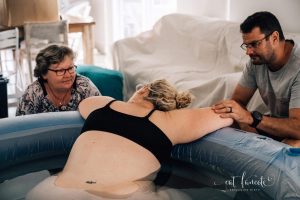
https://birthphotographyperth.com.au/
So, what is the difference between a homebirth and a freebirth?
It is really important to distinguish between a homebirth and a freebirth.
Unfortunately, there is a lot of stigma around homebirths, and the perception might be that they are unsafe or reckless, so many women don’t openly discuss their decision to birth at home as they are afraid people will make uneducated comments about their choices.
A planned homebirth is at home, attended by a medical professional such as a midwife who is there to provide clinical care and monitor a physiological labour and birth.
The midwife is registered and highly trained in physiological birth and in identifying if something is not right, or the woman and baby needs medical assistance, and they have the necessary equipment available to administer care or make the decision to transfer into a hospital.
Research suggests that planned homebirth for women with low risk pregnancies is as safe for babies and their mothers as birthing in hospital.
For more information on the safety of homebirth you could check out the resources in the Homebirth Australia website or Facebook page, where they have a lot of evidence-based information.
Here in WA homebirths are offered as part of a government-funded program such as the Community Midwifery Program (CMP) or with a Privately Practising Midwife (PPM) who may also have admitting rights to King Edward Memorial Hospital or Fiona Stanley Hospital.
It’s important to note that this differs from state to state.
A freebirth is usually at home as well, but the key difference is that the couple have planned and chosen to have an unassisted birth at home without any medical support.
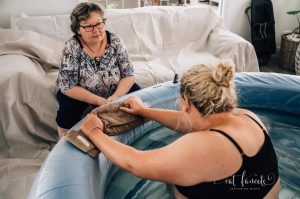
https://birthphotographyperth.com.au/
Is it illegal to freebirth?
No………… having a freebirth is not illegal.
In WA and SA, we do have legislation called the Health Practitioner Regulation National Law and Section 123A discusses “Restricted Birthing Practices”.
In this section of the legislation – “midwife” means a person who is registered under the Law in the midwifery profession.
“Restricted birthing practice” means undertaking the care of a woman by managing the 3 stages of labour, or any part of those stages.
A person must not carry out a restricted birthing practice unless the person –
- is a medical practitioner, or
- is a midwife, or
- is a student who carries out the restricted birthing practice in the course of activities undertaken as part of –
- an approved program of study for the medical or midwifery profession; or
- clinical training in the medical or midwifery profession; or
- is acting under the supervision of a medical practitioner or midwife and in accordance with any requirements set out in a code or guideline approved, under section 39, by the National Board established for the relevant profession; or
- is providing emergency assistance to a woman who is in labour.
Penalty for this subsection: a fine of $30,000.
To read the full WA Regulations CLICK HERE
To be clear a doula is not responsible for managing birth and I think that is the key wording to keep in mind, and they definitely do not perform restrictive birthing practices.
They are a support person providing comfort measures.
Nowhere in this legislation does it say that a doula cannot attend a homebirth without a midwife present or that it is illegal.
Nowhere does it say that a doula cannot attend a freebirth or that it is illegal.
Most doulas will be at a homebirth at different times during the early stages of labour providing massage, acupressure, meditation, relaxation techniques, making food, looking after children, cleaning the house, preparing the birth space and birth pool and anything else that the mother needs.
As the labour progresses the doula will stay there constantly with the couple until after the birth. She may be there for 2 to 3 hours after the birth, cleaning up, emptying and cleaning the birth pool if it has been used, preparing food, teas and coffees, putting towels and linen in the washing machine, anything that needs doing to ensure the mum doesn’t have to do anything and can focus on bonding with her baby and partner as a family.
Every birth will be different and based on the wants and needs of the woman and her partner
These things are hardly considered restrictive birthing practices.
These regulations do not deny a woman the choice of whether her baby is born at home or in a hospital. Nor does it deny a woman the choice to have a support person present throughout her pregnancy to provide emotional or social support.
However, what these regulations do clearly outline is that a doula is not a medical professional and cannot perform the duties of a midwife and women should not see doulas as a replacement for midwives.
In my opinion if you had a doula that was telling you that she can do anything a midwife can do then that would raise red flags for me and would clearly identify her as not being a doula.
On the other hand, a midwife can perform all the things that a doula does, but they are probably less likely to spend hours in early labour providing those comfort measures because they need to be well rested and alert for the more intense stage of labour, birth and after birth.
Having worked with some of the private midwives, they love it when a doula is there to provide all those comfort measures while keeping the energy positive and calm, which is conducive for a physiological birth.
Many cultures ensure that a birthing woman is surrounded by women who are there for comfort, encouragement, confidence and to just hold space.
Just because you haven’t thought of having a doula, or wouldn’t feel comfortable having a doula at your birth to support you, does not mean that other women shouldn’t do so.
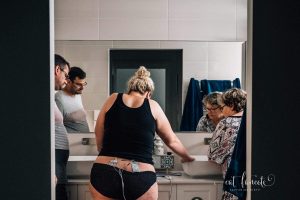
https://birthphotographyperth.com.au/
Does a doula need a license to practice?
I saw a comment from one midwife saying “doulas are not qualified or licensed” so this is implying that midwives (and probably the majority of the public) think doulas are stepping into the role of a midwife, which they are not, and again if you had someone who was doing that, then they are not a doula.
A doula doesn’t practice as a midwife or perform restrictive birth services that a midwife would, but they could (if trained) perform CPR and first aid in an emergency situation as per the legislation (123A (2) (e)).
So, the best way to describe a doula is as a support person or a birth coach. They don’t manage labour and birth, but they do provide comfort measures – you don’t need a license for that.
Is the doula industry regulated?
Here in Australia the doula industry is unregulated, so this means there is no governing body or accreditation for doulas, however there are many doula training organisations that offer high quality training and ongoing support, mentoring and continuing professional development for doulas, so they are highly trained in what they do.
We also have the Doula Network Australia, which is the only incorporated association in Australia dedicated to the integrity, professionalism and ongoing training of doulas and the doula industry.
Doulas are contracted privately and work for the couple ensuring their wants and needs are of the highest priority, without third party intervention.
But what is the real question we should be asking?
In my opinion along with many other birth workers including midwives, we feel the real question we should be asking is why are these women looking outside of the maternity system and freebirthing?
Perhaps some of them feel highly educated, knowledgeable, prepared, and confident in their body’s ability to birth without medical help.
Perhaps they are a birth worker themselves and feel confident in birthing without medical assistance.
Some women may have birthed previously and feel they have educated themselves on the risks and what could go wrong, what they can do in those situations, and they may have also undertaken courses in first aid, CPR, and neonate resus to give them the best chance of working through any deviations to their physiological birth.
They also know that if things start to deviate then they can call an ambulance and birth is seen as a priority one call out.
They have made an informed choice to birth this way.
Many who freebirth don’t have a doula present, but if they did, then they are aware that they are not hiring a doula as a replacement for a midwife, and they take full responsibility for their choices and any consequences.
OR……
Perhaps they have had a traumatic hospital experience previously and the thought of birthing in the hospital environment again brings up so much fear that the thought of birthing in that system again is horrifying.
Perhaps some women feel the system has failed them in the past and they no longer trust the system.
Perhaps women are not able to get into a publicly funded homebirth program like the Community Midwifery Program.
Perhaps women are concerned that even if they are accepted, they are not guaranteed to have a homebirth with CMP as midwives can be pulled away into the hospital when they are short-staffed or they have already attended births and are tired and there is no back up so if women ring their midwife in labour, they are told they now need to go into the hospital to birth instead of their planned home birth.
Perhaps they then try to find a private practising midwife, but even though the number of private midwives has grown, we are still limited, and they book out so far in advance that it is difficult to find one, and the cost of having a private midwife may also be out of reach for many couples.
Although I’d like to add, once a couple look at the break down of the cost, and what is actually included they will recognise that it is cheaper to have a Private Practising Midwife than an Obstetrician and you get so much more including 6 weeks postpartum care – that is invaluable.
Perhaps they feel their wants and needs for their birth are being dismissed so they decide to discontinue their care with the hospital.
Perhaps it’s because they don’t feel heard or respected, and their questions go unanswered, or they are made to feel they are just a vessel and the most important thing is a live baby, not a well mother too.
Perhaps they don’t want their birth to be managed by care providers that might lead to interventions and unnecessary caesareans.
I suggest if you haven’t seen the documentary “Birth Time” now would be a good time to watch it.
Perhaps they feel worried their partner will be sent home soon after the birth, which has been happening since the COVID restrictions.
Here in WA the government has lifted restrictions with the public at 80% third dose vaccinations, yet hospitals haven’t lifted their restrictions, so some birth partners are sent home soon after birth.
It doesn’t make sense that the partner can be with the labouring woman for many hours during labour in the birth suite then can’t spend time bonding with their baby or ensuring their partner is not alone or feeling safe and supported after the birth.
We hear staff in hospitals are stretched to the limits, particularly since the mandates and many midwives have left their jobs, so it makes sense that women feel they will get more support and comfort at home.
Perhaps it is fear and distrust of the care providers and hospitals based on their own experience or hearing other women’s experiences of things being done to them without consent and obstetric violence – yes this is happening and just because you haven’t heard about it, doesn’t make it untrue!
Perhaps women are recognising that hospital policies are not the Law and they don’t want to be bullied or coerced into unnecessary interventions.
So, they choose to stay home without any medical support.
We hear all the time that the maternity system is broken.
But it’s not broken.
It is working exactly how the hospitals want it to work.
But then it is the woman who is leaving the hospital broken.
She falls through the cracks.
She is left to fend for herself with a new baby.
To the care provider and the hospital, they have done their job.
She has a healthy baby.
But what about the mum?
We need a healthy mum too.
A healthy baby is not all that matters.
A healthy mum matters too for a healthy family.
I bet many people wouldn’t know that here in Australia the highest cause of maternal death is suicide.
One in three women report that their birth was traumatic and two thirds of those say it was because of the way they were treated by their care providers.
A birth in a hospital usually means a managed birth.
More women are recognising that a physiological birth provides many more benefits to mother and baby, and they want to avoid being medically managed.
They want to avoid unnecessary tests, scans, inductions, drugs, and time limits.

Unfortunately, hospitals rely on managed birth, so they stay within time schedules.
- Women are induced.
- There are timelines for each stage of labour.
- If those timelines are not on track, then we see interventions.
- Some interventions lead to unnecessary caesareans.
We know private Obstetricians may have anywhere between 40 to 60 women booked per month.
The logistics of that is a nightmare for hospitals.
If you look at how many obstetricians there are in Perth, and the number of private hospitals and how many birth suites each hospital has – that’s a lot of women coming in for birth, so of course, those women and their births need to be medically managed.
Which means women need to be induced and a schedule or timeline implemented.
Is that ethical?
Research shows an induction should only be performed when the risk of continuing the pregnancy outweighs the risk of the induction process.
But our induction rate is incredibly high, and so is our national caesarean rate sitting at 36%, well exceeding the World Health Organisation’s recommendations of between 10% and 15%….
Not to mention here in Perth, we have a private hospital with the highest caesarean rate in Australia.
Unfortunately, pregnancy is managed right from when you visit the GP to confirm your pregnancy.
You are asked if you have private health insurance and if so, given a list of Obstetricians and told to book straight away as they book out quickly.
If you don’t have private health insurance, you are given the information on which public hospital you can go to based on your catchment area.
Rarely is a woman told that there are other options, which include the family birthing centres, publicly funded homebirth, community midwifery program, midwifery group practice or privately practising midwife.
Somehow over time it became the vogue thing to do to birth with an Obstetrician in a private hospital, and women thought by going private they would experience a better birth – but we know this is not the case.
As I mentioned before, watch the documentary Birth Time or the Face of Birth to understand what I mean.
Obstetricians are highly trained surgeons, their expertise is working with women who have high risk pregnancies or problems with their pregnancy, which may require them to be observed or treated more regularly, have interventions or caesarean.
When it comes to physiological birth, midwives are the experts.
They too are highly trained in identifying when a birth is deviating from the normal physiology parameters.
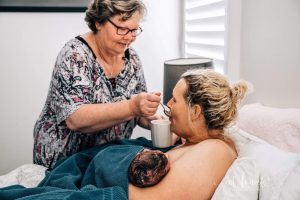
https://birthphotographyperth.com.au/
Aren’t doulas experts in birth too?
Doulas are not medical experts.
They are experts when it comes to providing tools and techniques for comfort measures and evidence-based information, but they are not medically trained to identify if a birth is deviating from uneventful and an emergency is imminent.
So, when it comes to a midwife and a doula – there is no comparison – they are two completely different roles.
If a doula is promoting herself as being able to do what a midwife does, then she is not a doula.
I know that there are lots of doulas across Australia offering freebirth services, but this does not mean that they are offering restricted birth practices.
For me, I would not offer my services at a freebirth, because I believe that a midwife should be involved in all births to identify problems and provide fast medical attention when needed or know when it is time to transfer to a hospital for further medical assistance.
If you are wanting to freebirth, this is a choice only you can make, but you cannot hire a doula to be a replacement for medical care.
You need to understand what a doula can do, what is within their scope of practice and why you have chosen to hire them.
What is the role of the doula at your freebirth?
What has your doula told you is their role?
What do they do and don’t do, because anything that is listed under the “restrictive birthing practices” is illegal?
Being there as a support person providing comfort measures is not illegal.
A reputable doula will have a contract that clearly outlines their role of what they do and what they don’t do and reinforce that they are not there in a medical capacity.
They will highlight that they cannot perform any restrictive birthing practices, cannot diagnose, and cannot tell a woman what she should or should not do during her pregnancy, her labour, and her birth.
A doula is not trained in identifying, assessing, and treating problems during pregnancy, labour, birth or after birth.
The doula does not make decisions on behalf of the woman or partner.
And a doula is not there to replace medical professionals.
For the doulas out there, make sure you have comprehensive contracts that clearly outline what you do, what you don’t do and have extensive conversations about this with your clients if you are attending a freebirth and keep notes of your discussions, decisions, and outcomes.
Doulas are there to mother the mother and help the partner to be the very best support person they can be, so they feel more satisfied about their participation in the birth of their child as well.
I want to finish by sharing a quote from Dr John Kennell who was a paediatrician and researcher and was also a huge advocate for doulas, saying that they were an “essential service for women.”
He recognised during his research that maternal outcomes were improved if women had other women there supporting them during labour, birth, and the postpartum period.
His quote from 1998 highlights his support of doulas and is celebrated by all doulas then and now:
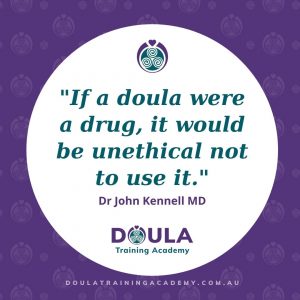
Doulas really do make a difference!

